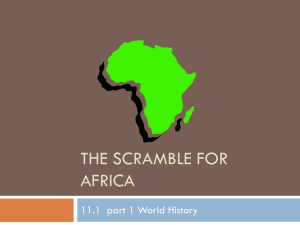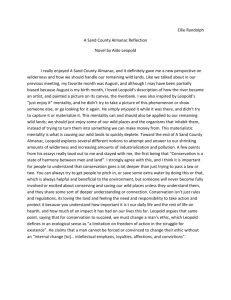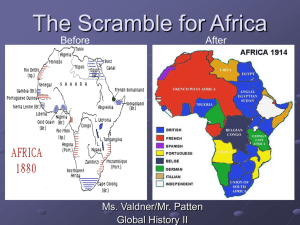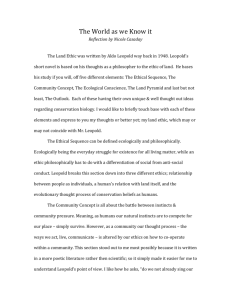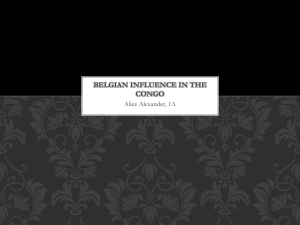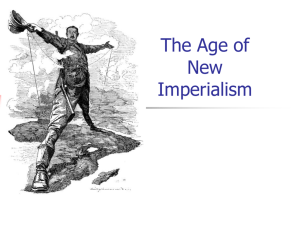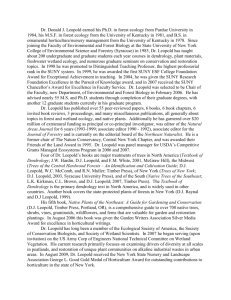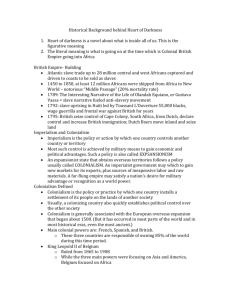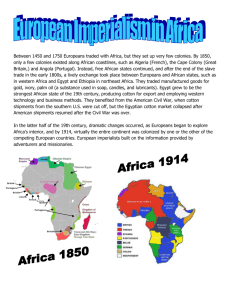KLG Primary Source Readings
advertisement
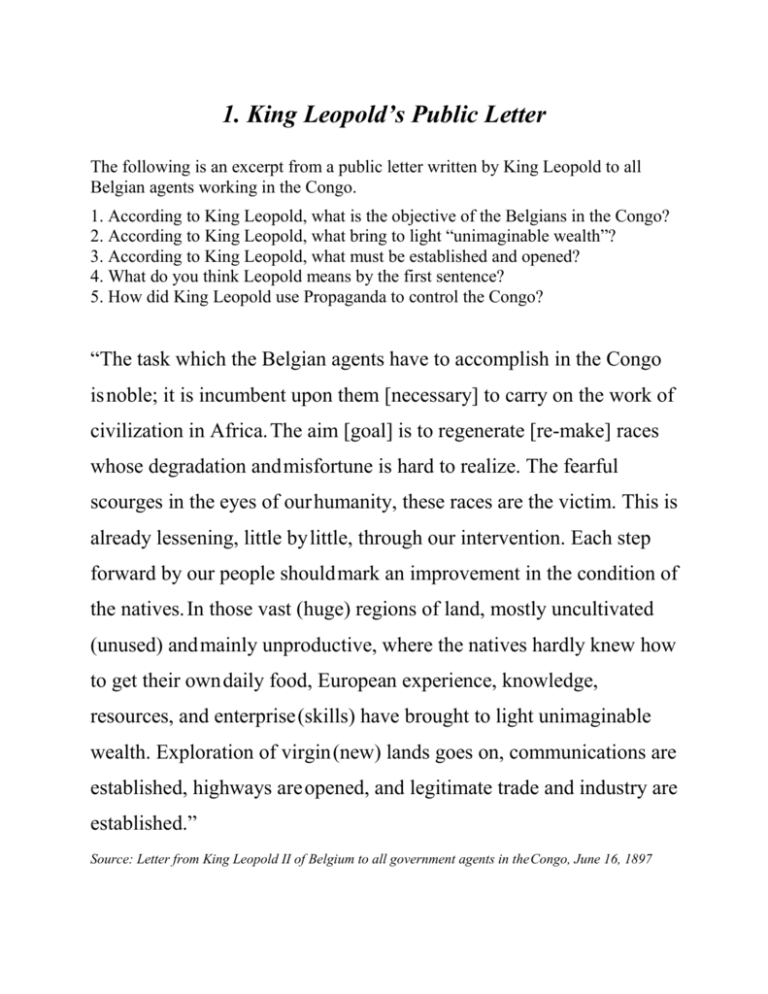
1. King Leopold’s Public Letter The following is an excerpt from a public letter written by King Leopold to all Belgian agents working in the Congo. 1. According to King Leopold, what is the objective of the Belgians in the Congo? 2. According to King Leopold, what bring to light “unimaginable wealth”? 3. According to King Leopold, what must be established and opened? 4. What do you think Leopold means by the first sentence? 5. How did King Leopold use Propaganda to control the Congo? “The task which the Belgian agents have to accomplish in the Congo is noble; it is incumbent upon them [necessary] to carry on the work of civilization in Africa. The aim [goal] is to regenerate [re-make] races whose degradation and misfortune is hard to realize. The fearful scourges in the eyes of our humanity, these races are the victim. This is already lessening, little by little, through our intervention. Each step forward by our people should mark an improvement in the condition of the natives. In those vast (huge) regions of land, mostly uncultivated (unused) and mainly unproductive, where the natives hardly knew how to get their own daily food, European experience, knowledge, resources, and enterprise (skills) have brought to light unimaginable wealth. Exploration of virgin (new) lands goes on, communications are established, highways are opened, and legitimate trade and industry are established.” Source: Letter from King Leopold II of Belgium to all government agents in the Congo, June 16, 1897 2. King Leopold to the Missionaries The following is an excerpt from a private letter written by King Leopold to a group of Belgian missionaries about to leave for the Congo in 1883. 1. What two tasks does King Leopold give the missionaries? 2. How should the missionaries interpret the Gospel? 3. Why does King Leopold want the followers to “love poverty”? 4. How will the ways of the missionaries prevent revolt? 5. How did King Leopold use Propaganda to control the Congo? “Reverends, Fathers and Dear Compatriots: The task that is given to you is very difficult. You will go certainly to evangelize, but your priority must be Belgium interests. Your principal mission in the Congo is never to teach the savages to know God, this they know already. They speak and submit to a Mungu, one Nzambi, one Nzakomba, and what else I don’t know (all of these are native African gods). Your essential role is to facilitate the task of administrators and industrialists, which means you will go to interpret the gospel in the way it will be the best to protect our interests in that part of the world. Your knowledge of the gospel will allow you to find texts encouraging your followers to love poverty, like “Happier are the poor because they will inherit the heaven" and, "It’s very difficult for the rich to enter the kingdom of God." You have to make them abandon everything which gives them the courage to affront [resist] us. Evangelize the savages so that they stay forever in submission to the white colonialists, so they never revolt against the restraints they are undergoing. Recite every day-"Happy are those who are weeping because the kingdom of God is for them." Convert the blacks always by using the whip.” Source: Letter from King Leopold II of Belgium to Colonial Missionaries, 188 3. Excerpt from King Leopold’s Ghost (1) The following is an excerpt from the book King Leopold’s Ghost written by American author and journalist Adam Hochschild. King Leopold’s Ghost was the recipient of many awards and was the basis of a 2006 documentary. 1. What does Hochschild mean by the phrase “Humanitarian veneer”? 2. What three ideas would King Leopold cite as part of his “Humanitarian veneer”? 3. What is a “philanthropist:? How did King Leopold pretend to be one? 4. Why did King Leopold want slaves and raw materials? 5. How did King Leopold use Propaganda to control the Congo? “As king of a small country with no interest in colonies, King Leopold realized that a colonial push of his own would require a strong humanitarian veneer [appearance]. Curbing the slave trade, moral uplift, and the advancement of science were the aims he would talk about, not profits. In 1876, he began planning a step to establish his image as a philanthropist and advance his African ambitions. He organized a conference of explorers and geographers. Underlying most of King Leopold’s excitement was the hope that Africa would be a source of raw materials to feed Belgium’s Industrial Revolution, just as the search for slaves had driven many countries to become interested in Africa.” 4. Excerpt from King Leopold’s Ghost (2) The following is an excerpt from the book King Leopold’s Ghost written by American author and journalist Adam Hochschild. King Leopold’s Ghost was the recipient of many awards and was the basis of a 2006 documentary. 1. How did Stanley manipulate the natives to sign illegal documents? 2. What punishment was there for natives that did not meet the rubber quota? 3. "One could say the Congo was made with the whip". What do you think this quote means? 4. What is “Spin Control”? Give an example from the excerpt. 5. How do you believe Belgian Imperialism impacted the Congo well into the 20th Century? Hundreds of feet above the ground boys haul themselves up narrow tree trunks in search of valuable rubber. "We passed a man on the road who had broken his back falling from a tree while tapping rubber vines", reports a missionary in the Congo during the reign of King Leopold II. "People were afraid of this work", says a Luebo village elder. Rubber had to congeal to be collected and removing the congealed rubber was excruciating. Yet there was little choice - their European conquerors were determined to plunder this country of its natural resources, in the process making slaves of the indigenous population. The history of Congo's exploitation begins with the explorer Stanley. He, on behalf of Leopold, exchanged bales of cloth with the natives for signatures on land rights documents they did not understand. Yet Stanley and Leopold managed to hide their exploitation and the disturbingly sadistic methods they used to enforce slave labor behind a stage-managed smokescreen of apparent innocence. As Adam Hochschild, author of the novel 'King Leopold's Ghost' points out, "Leopold was a master of spin control". What his spin was hiding was unspeakable. "The right hands, I counted 81 in all", William Henry Sheppard reported, after seeing the hands of Africans that had been severed for not meeting rubber quotas. This government-sanctioned violence was all carried out with one aim, to make profit. Joseph Conrad described what he saw in the Congo as, "the vilest scramble for loot that ever disfigured the history of human conscience". By the time Leopold came to relinquish his control of the Congo the population had been halved and its society destroyed. His predatory exploitation of the colony had started a trend that has lasted up until the modern day, setting an example for the extraction of wealth that has continued through the generations. As Jules Marchal, a former officer of the Belgian Congo admits, the brutality continued unabated: "One could say the Congo was made with the whip". In 1960 the Congo was given its independence and the rise of a young and principled politician, Patrice Lumumba, brought some hope for a better future. But hope was not to last long. Colonial interests in its natural resources had not gone away and an independent politician like Lumumba was a threat. The combined machinations of the Americans, the Belgians and the United Nations resulted in Lumumba's capture and death. Joseph Mobutu, the man who would remain in power for the next 38 years, carried out the coup. During his rule he maintained close links with the Western superpowers. They continued to benefit from the Congo's natural resources as their stooge Mobutu was rewarded with vast wealth. Mobutu was finally deposed but King Leopold's ghost continued to ravage the rich Congo lands as various foreign-sponsored, "ragtag armies marauded the countryside". The conflict officially ended in 2003, but the years of turmoil, war and dreadful atrocities had taken its toll. Speaking about the continuing political crisis, one politician says, "the situation here is so terrible that all they want is some sort of peace". This vivid documentary offers an engrossing insight into the grim colonial legacy which still haunts the Congo today. 5. Paul Leroy-Beaulieu on the Desirability of Imperialism, 1891 1. Beaulieu says there are four different types of civilizations, Western civilization being one. How does he describe the other three types of civilizations? 2. How does he describe the world inhabited by “barbarians or savages”? 3. What two justifications does Beaulieu to allow for Western civilization to have a “right of intervention”? What does this phrase mean? 4. How does Beaulieu differentiate between Imperialism and Commerce or commercialism? 5. In the end, how does Beaulieu define Imperialism? How does this definition differ from the one we discussed in class? “It is impossible not to consider Imperialism as one of the tasks imposed on the civilized states for the last four centuries, more particularly on our age. The present-day world is composed of four different parts in terms of types of civilization. That of Western civilizationour own part. A second part [is] inhabited by people of a different civilization, but organized in compact, coherent and stable societies and destined by their history and present character to govern themselves-the Chinese and Japanese peoples for example. In the third part live peoples advanced enough in some respects, but ones which either stagnated or bad not been able to constitute themselves as unified, peaceful, progressive nations, following a regular development. . . . India before the British conquest, Java, and the Indochinese peninsula represent particularly this third type. Finally, a great part of the world is inhabited by barbarian tribes or savages, some given over to wars without end and to brutal customs, and others knowing so little of the arts and being so little accustomed to work and to invention that they do not know how to exploit their land and its natural riches. They live in little groups, impoverished and scattered, in enormous territories which could nourish vast numbers of people with ease. This state of the world implies for the civilized people a right of intervention . . . ln the affairs of the peoples of the last two categories. It is neither natural nor just for the civilized people of the West to be cooped up indefinitely and jammed into the restricted spaces which were their first home. Nor is it natural and just that they there accumulate the marvels of science, the arts and civilization, that they see the rate of interest fall more each day for lack of good investment Opportunities, while they leave perhaps half the world to little groups of ignorant, ineffectual men who are like feeble children, or to exhausted populations, without energy, without direction, who may be compared to old men. Imperialism is often confused with commerce or with the opening of commercial markets. Imperialism means something quite different from the sale or purchase of commodities. It entails a profound action on a people and a territory, providing the inhabitants with some education and regular justice, teaching them the division of labor and the uses of capital when they are ignorant of these things. It opens an area not only to the merchandise of the mother country, but to its capital and its savings, to its engineers, to its overseers, to its emigrants. . . . Such a transformation of a barbarian country cannot be accomplished by simple commercial relations. Imperialism is thus the systematic action of an organized people upon another people whose organization is defective; and it presupposes that it is the state itself, and not only some individuals, which is responsible for the mission.”
